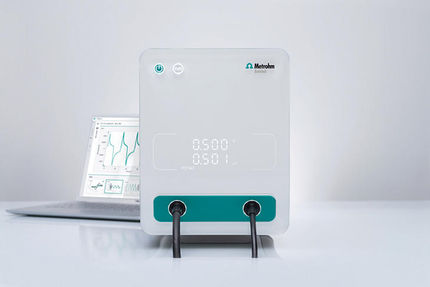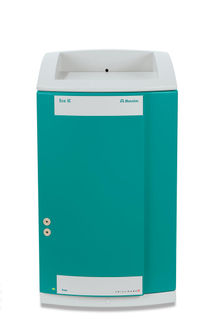National Agency for Food and Drug Administration and Control
The National Agency for Food and Drug Administration and Control (NAFDAC) is a Nigerian government agency responsible for regulating and controlling the manufacture, importation, exportation, advertisement, distribution, sale and use of food, drugs, cosmetics, medical devices, chemicals and prepackaged water.
History of NAFDAC
NAFDAC was inspired by a 1988 World Health Assembly resolution requesting countries' help in combatting the global health threat posed by counterfeit pharmaceuticals, and amidst growing concerns about the growing problem of fake and poorly-regulated drugs in Nigeria.[1]
In December 1992, NAFDAC's first governing council was formed, chaired by Ambassador Tanimu Saulawa was formed. In January 1993, supporting legislation was approved as legislative Decree No. 15 of 1993, and January 1, 1994 NAFDAC was officially established, as a “parastatal of the Federal Ministry of Health”.[2]
NAFDAC replaced an earlier Federal Ministry of Health body, the Directorate of Food and Drug Administration and Control, which had been deemed ineffective, largely due to a lack of laws concerning fake drugs.
Establishment
Through the past two decades in Nigeria, the problem of fake, counterfeit, and adulterated drugs has been a very big issue. In addition, fake drugs proved a major factor in contributing to high death rates.[1] “over 150 children died in 1989 as a result of a formulation error in a drug.” Such problems led to the establishment of NAFDAC, which would help create a fake-drug-free environment. The intent was to ensure secure, effective, inexpensive, and high quality medicines. The problem of fake drugs was so severe that “neighboring countries such as Ghana and Sierra Leone officially banned the sale of drugs made in Nigeria.”[1] The issue of fake drugs did not just stop there, but it went to the extent that “drugs were hawked even in commercial buses.” All these problems affected Nigeria as a whole. On the one hand, NAFDAC has a certain structure that controls it.
Structure of NAFDAC
[2]“(NAFDAC) is headed by a chairman who presides over a governing council appointed by the president on the recommendation of the Minister of Health.” Furthermore, the council has other members and they are listed below:
- The Permanent Secretary of the Ministry of Health
- The Director-General of NAFDAC
- Standard Organization of Nigeria (SON)
- The National Institute for Pharmaceutical Research and Development (NIPRD)
- The chairman of the Pharmacists’ Council of Nigeria (PCN)
- The chairman of the National Drug Law Enforcement Agency (NDLEA)
- A representative each of the Pharmaceutical Group and the Food and Beverages Group of the Manufacturers’ Association of Nigeria.
Three people from the general public are also represented on the council.[2]
Several units make up NAFDAC:
- The Legal Unit is charged with offering legal advice on “law arising from Employee-Employer relationship and is the custodian of legal documents and all agreements relating to the Agency."[2]
- The Public Relations Unit is headed by the Director-General’s office. Its main function is to inform, sensitize, enlighten and create awareness concerning the role of the Agency. The agency is divided into eight directorates with the last two newly added.
- Internal Audit provides a means of measuring the effectiveness of the system of internal control and accounting, and carries out special investigations.
Directorates
The agency is divided into eight directorates:
- Registration and regulatory affairs
- Inspectorate
- Laboratory services
- Narcotics (and controlled Substances)
- Planning, Research and Statistics
- Finance and administration
- Enforcement
- Ports Inspection
Functions of NAFDAC
NAFDAC has various main functions. According to the requirements of its enabling decree, the Agency was authorized to:
- Regulate and control the importation, exportation, manufacture, advertisement, distribution, sale and use of drugs, cosmetics, medical devices, bottled water and chemicals
- Conducts appropriate test and ensure compliance with standard specifications designated and approved by the council for the effective control of quality of food, drugs, cosmetics, medical devices, bottled water, and chemicals….
- Undertake appropriate investigation into the production premises and raw materials for food, drugs, cosmetics, medical devices, bottled water and chemicals and establish relevant quality assurance system, including certification of the production sites and of the regulated products
- Undertake inspection of imported food, drugs, cosmetics, medical devices, bottled water, and chemicals and establish relevant quality assurance system, including certification of the production sites and of the regulated products.
- Compile standard specifications and regulations and guidelines for the production, importation, exportation, sale and distribution of food, drugs, cosmetics, medical devices, bottled water and chemicals
- Undertake the registration of food, drugs, medical devices, bottled water and chemicals
- Control the exportation and issue quality certification of food, drugs, medical devices, bottled water and chemicals intended for export
- Establish and maintain relevant laboratories or other institutions in strategic areas of Nigeria as may be necessary for the performance of its functions.
NAFDAC envisions that by making these functions known, that its actions will be apparent “in all sectors that deal with food, cosmetics, medical devices, bottled water, and chemicals to the extent of instilling extra need for caution and compulsion to respect and obey existing regulations both for healthy, living and knowledge of certain sanctions or default."[2]. Despite the establishment of NAFDAC, the concept of fake drugs did not still end.
New Amendments since 2001
Dissatisfied with progress in combatting fake drugs, President Olusegun Obasanjo's administration dissolved the management of NAFDAC in August 2000. In April 2001, a new management, with Dr. Dora Akunyili as Director-General, was inaugurated.[1] The new management re-organized the agency, and has been successful in the recent past due to three new federal policies:
- The outright ban on the importation of drugs and other regulated products through land borders.
- The designation of Calabar and Apapa sea ports and Murtala Muhammed and Mallam Aminu Kano International Airports as exclusive ports of entry for the importation of drugs and pharmaceutical raw materials.
- Release of shipping and cargo manifests by the Nigerian Ports Authority, shipping lines and airlines to NAFDAC inspectors. [1] For several years, Nigeria was drowned in an ocean of fake drugs. Then “Dr. Dora Akunyili approached her job with zeal…, to preserve in ridding the Nigerian market of fake drugs and contaminated water sold as “pure water.”[3]
Achievements
NAFDAC has several achievements over the years.
- Creation of 6 Zonal and 36 state offices for easier accessibility, which are being equipped to function effectively.
- Organizing workshops to enlighten various stakeholders: (a) Pure water producers (b) Patent and Proprietary Medicine Dealers Association (PPMDA), (c) National Union of Road Transport Workers and National Union of Road Transport Owners (NURTW & NURTO), etc.
- NAFDAC has not only raised awareness in Nigeria, but has also sensitized other countries e.g. India, China, Pakistan, Indonesia, Egypt.
- In concert with Chairman, House Committee on Health and his members, we have held meetings with Ambassadors of countries identified with exporting fake drugs into Nigeria and solicited their support to stop this ugly trend.
- The results of the public enlightenment are very cheering because last year alone, drugs worth about 2 billion Naira were destroyed publicly. These fake drugs were from four sources; those handed over by repentant traders, those found in secret warehouses on tip off by the drug sellers and the public, and those seized by the drug sellers’ internal task forces and NAFDAC task forces.
- To ensure that the wholesale Drug Mart comes to be, because it is the bedrock of the sanitization exercise.
- Making NAFDAC activities more efficient to reduce delays in registration/inspection, etc.
- NAFDAC has held consultations with national and international stakeholders leading to various areas of assistance; in the areas of staff training, equipment donations and information sharing from United States Food and Drug Agency (USFDA), Environmental and Occupational Health Science Institute (EOHSI), South African Medicines and Medical Devices regulatory Agency (SAMMDRA), etc.
- NAFDAC has sent proposals for reviewing obsolete laws to the National Assembly.
- New guidelines and Standard Operating procedures (SOP) have been put in place for all regulatory processes.[4]
Stakeholders
NAFDAC ensures it maintains very close contact with a number of national and international organizations whose activities relate to the functions of NAFDAC. Such Organizations include:
- The Standard Organizations of Nigeria (SON)
- The National Drug Law Enforcement Agency (NDLEA)
- The National Institute for Pharmaceutical Research and Development (NIPRD)
- The Pharmacists Council of Nigeria (PCN)
- The Pharmaceutical Manufacturers Group of Manufactures Association of Nigeria (PMG-MAN)
- The Consumer Association of Nigeria
- The Federal Environmental Protection Agency (FEPA)
- Institute of Public Analysts of Nigeria (IPAN)
- Pharmaceutical Society of Nigeria (PSN)
- Association of Food, Beverage and Tobacco Employees of Nigeria (AFBTE)
- National Association of Government Approved Freight Forwarders (NAGAFF)
- Association of Nigeria Custom Licensed Agents (ANCLA)
- Patent and Proprietary Medicine Dealers Association (PPMDA)
- National Union of Road Transport Workers (NURTW)
- National Association of Road Transport Owners (NARTO)
In order to keep in touch with the international scene for information, training, co-operation assistance, aid and for financing of specific projects especially in these days of global and national austerity, the agency maintains close relationship with a number of International Agencies some of which include:
- The United Nations Drug Control Program (UNDCP)
- The World Health Organization (WHO)
- The Codex Alimentarius Commission of Food and Agricultural Organization (CACFAO)
- The United States Food and Drug Administration (USFDA)
- The Environmental and Occupational Health Science Institute (EOHSI).
[5]
References
- ^ a b c d e NAFDAC: Battle against fake drugs. 2003-03-04. Retrieved on 2006-03-25
- ^ a b c d e About NAFDAC. 2005. Retrieved on 2006-03-27
- ^ The Director General: Prof. Dora Nkem Akunyili (OFR) – Biography. NAFDAC Nigeria. Retrieved on 2007-07-25
- ^ Achievements. (2005). Retrieved on March 31, 2006, from http://www.nafdacnigeria.org/achievements.html
- ^ Stakeholders. (2005). Retrieved on April 10, 2006 from http://www.nafdacnigeria.org/stakeholders.html
this is all about nafdac tosan ekele
NAFDAC ABA ENNEX OFFICE
Mr. Emmanuel F. Bogunjoko
N.A.F.D.A.C. Head of Food and Drug Central Laboratory,
Tel: - +234-8059414192(PR)
E-mail: nafdacdg@yahoo.com
See also
External links
|







